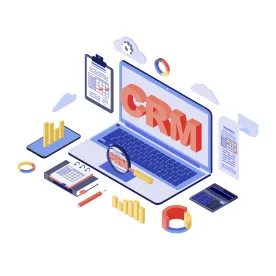According to Gartner, customer relationship management (CRM) is the largest and fastest-growing enterprise application software category. Worldwide spending on CRM is expected to reach $114.4 billion by 2027. So what is CRM, and what does it have to do with marketing?
What is CRM in marketing?
Customer relationship management (CRM) is a technology used to manage a company’s relationships and interactions with customers and potential customers. The goal: to enhance business relationships and grow the business. An attorney CRM software, for instance, allows law firms to stay connected to clients and prospects, simplify processes, and boost profitability.
The term CRM typically refers to a CRM system, a technology tool that supports contact management, sales, productivity, and more. CRM tools manage relationships across the entire customer lifecycle, including marketing, sales, digital commerce, and customer service interactions.
A CRM solution helps an organization focus on its relationships with people – customers, colleagues, vendors, and suppliers — throughout their interactions with them, including finding and engaging new customers, winning their business, and providing support and additional services throughout the relationship.
What are the Types of CRM?
There are several types of CRM, and organizations must understand the differences between them to determine the right option. The 4 types of CRM systems include:
-
Operational CRM. The most common type of CRM is the operational CRM, which performs the broadest range of functions. Operational CRM streamlines the various processes utilized when building customer relationships and applies them to the central business process. These platforms help companies generate leads, convert them into contacts, and provide the infrastructure necessary to retain customers. In addition, operational CRM systems seize customer details and use them to provide superior service through marketing, sales, and service automation. Some common examples of operational CRMs include Mailchimp, HubSpot, and Salesforce.
-
Analytical CRM. This CRM type leverages customer data into trends and insights that enable organizations to improve customer experience. They are good options for mid to large-size companies that collect vast amounts of data and want to condense it into actionable information. Two examples of analytical CRMs include:
-
Salesforce CRM Analytics: a part of Salesforce CRM that provides data visualization
-
Zendesk Explore: reporting and analytics software that imports data from support and service options to help organizations gauge and improve customer service
-
-
Collaborative CRM. This focuses on customer service. Collaborative CRM systems bridge the gap between teams and departments, enabling various groups or areas within an organization to share customer data to make decisions and manage customer relationships. Some examples of collaborative CRMs include Microsoft Dynamics 365, a suite of tools for B2B organizations, and Copper, a collaborative CRM that integrates with Google Workspace to allow small businesses to use a central hub to access customer data.
-
Strategic CRM. This type of CRM specializes in long-term or ongoing customer relationships. A number of common features of a strategic CRM intersect with those of collaborative CRMs, like data regarding prior interactions with a particular customer. If the success of your law firm is contingent on repeat clients, a strategic CRM can help you identify why a client keeps coming back. The benefits of a strategic CRM are in its ability to form the foundation of data-driven marketing and operations strategies, offering insights into areas like marketing, sales, and customer service over the course of a client’s relationship with you.
When choosing a CRM system, organizations should identify needs and priorities, determine essential features, assess the vendors’ vision, viability, and support, and compare deployment and purchasing options.
What are the Benefits of CRM in Marketing?
CRM platforms provide many benefits to marketers, including:
Personalized Marketing
Organizations with practical customer experience frequently tailor their service and marketing efforts to individual customers and segments of customers. This personalized approach can increase customer satisfaction and sales; however, it can only be provided if organizations track necessary data. CRM platforms record vital customer information such as demographics, purchase history, and customer service interactions. Equipped with this information, these platforms can perform targeted advertising.
Increased Productivity
Organizations can streamline workflows by integrating their CRM platforms with other tools, such as calendar and electronic signature applications. For example, suppose an organization integrates its CRM platform with its e-signature application. In that case, the system automatically populates forms containing customer information – name, phone number, address, email, and more – from the CRM's repository. CRM integrations can also increase productivity. For example, if a CRM platform is integrated with an organization’s email and calendar apps, agents can view sales pipelines, customer interactions, and upcoming appointments in one central location.
Artificial Intelligence
Organizations can use CRM platforms to obtain critical business insights through artificial intelligence (AI). For example, CRM platforms with forecasting tools have the ability to detect trends in customer data and provide sales agents with recommendations regarding actions to take. In addition, some AI-powered CRM systems use sentiment analysis tools to discern customers' emotions during a given interaction.
Jan Hill also contributed to this article.



 />i
/>i

